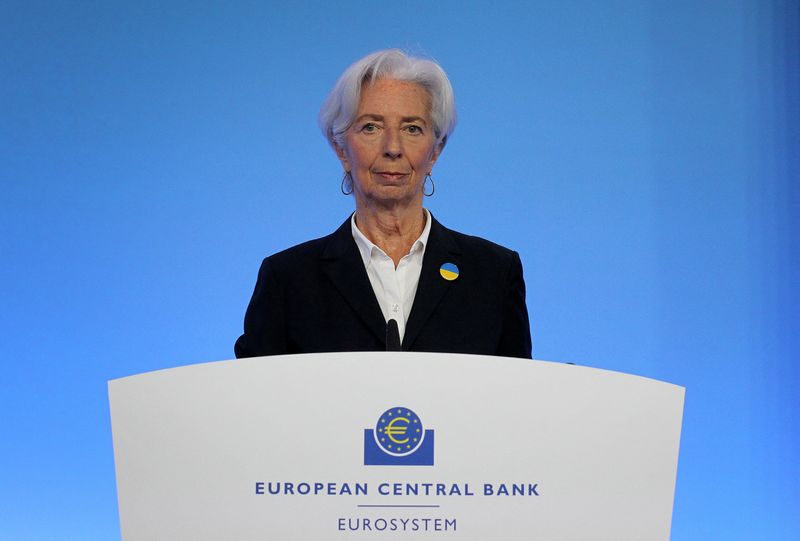LONDON (Reuters) – The European Central Bank said on Thursday it would end asset purchases in the third quarter, as soaring inflation outweighed concerns about Russia’s invasion of Ukraine for now.
The move surprised some investors who had expected the ECB to keep options open until there was more clarity about the impact of the war on the economy. But President Christine Lagarde said rates would not rise until some time after bond buying ends.
HIGHLIGHTS-Lagarde comments at press conference
Euro zone bond yields jump, euro cedes gains
Here are some comments from analysts and investors:
PIET CHRISTIANSEN, CHIEF ANALYST, DANSKE BANK
“Time will tell whether it’s a policy error, however the price stability mandate weighs very hard in the monetary policy decision here with market-based expectations above the 2% target for the coming 10 years.
“(Lagarde’s) assessment of a robust growth outlook on domestic demand must have been enough to continue this path towards neutral. With Lagarde, key focus is on data dependency, all meetings are live and to sum up the presser in three words: they never pre-commit.”
ANTOINE BOUVET, SENIOR RATES STRATEGIST, ING
“The fact that tapering is proceeding apace is a sign that the bar is high for the ECB to put normalisation off –1.9% inflation in 2024 is consistent with tapering and with the deposit rate being raised to 0% next year I would say.”
SILVIA DALL’ANGELO, SENIOR ECONOMIST, FEDERATED HERMES
“At a minimum, war-related uncertainty will ensure the ECB proceeds cautiously and gradually. In the worst-case scenario, it is possible the ECB will have to resort to a new emergency package of measures and delay lift off, although it looks like the fiscal levers available at both the EU and national levels will have to do the heavy lifting.”
OLIVER BLACKBOURN, PORTFOLIO MANAGER, JANUS HENDERSON
“The ECB defied expectations and leant hawkish into the inflation headwind blowing in its direction.
“The announcement came just ahead of a U.S. inflation print of 7.9% year-on-year, and the ECB is clearly worried about similar headlines. Reducing and potentially ending quantitative easing is not the same as raising interest rates, yet the consequences might be more wide reaching than the ECB would like.
“The collateral damage is already appearing in peripheral European sovereign credit spreads, with Italian yields jumping more than the German equivalents.”
GURPREET GILL, MACRO STRATEGIST, GOLDMAN SACHS ASSET MANAGEMENT
“Tightening in European financial conditions are likely to weigh on growth over the coming year. For these reasons and given President Lagarde’s commitment to preserve “maximum optionality in the face of maximum uncertainty”, we continue to see the prospect of a rate hike in Europe this year as limited, in contrast to market-implied pricing.
“Indeed, the ECB’s inflation forecasts imply annual price rises will moderate from 5.1% in 2022 to 1.8% in 2023, suggesting modest scope for rate hikes over the coming year.”
ADRIEN PICHOUD, CHIEF EUROPEAN ECONOMIST, SYZ BANK
“Today’s announcements…are a way to create as much flexibility as possible for the ECB’s monetary policy in the months ahead. With such flexibility, the ECB will be able to maintain very accommodative conditions if the impact of the war in Ukraine requires it, and to tighten financing conditions if made necessary by inflation developments.
“In the short run, those decisions ensure that financing conditions remain extremely accommodative for the euro area, thus continuing to support economic growth, especially in the current uncertain context.”
ARNE PETIMEZAS, SENIOR ANALYST, AFS GROUP
“Lagarde may be claiming maximum optionality and that today’s adjustments aren’t tightening, but the actual message is hawkish. And what Lagarde is really saying is: ‘we’re going to hike, unless inflation is not too bad or something really goes wrong in markets.’ And with that, they are opening the door wide for a hike of 25 basis points in September.
“I also think they are taking it too easy on the risks to economic growth as a result of the war. They should have highlighted that a bit more because the outcome is very uncertain and rather binary.”
ANNA STUPNYTSKA, GLOBAL MACRO ECONOMIST, FIDELITY INTERNATIONAL
“The ECB is facing a huge dilemma over the next few months.
“We think as the growth shock becomes more evident in the data over the next few weeks, ECB’s focus will likely shift away from high inflation focus towards trying to limit economic and market distress as the invasion of Ukraine and its consequences ripple through the system.
“We do not expect the ECB to hike rates this year and we believe the risk is skewed towards more QE, not less especially if gas supplies from Russia to Europe are disrupted going forward.”
MARCHEL ALEXANDROVICH, EUROPEAN ECONOMIST, SALTMARSH ECONOMICS, LONDON
“For the time being they are choosing to look through some of the uncertainty created by the war. The more immediate impact will be the rise in inflation and we could get inflation above 6%, which means the risks of entrenched inflation expectations.
CHRIS SCICLUNA, HEAD OF RESEARCH, DAIWA CAPITAL MARKETS
“The statement was more hawkish then markets had priced in, which is why we have had a significant widening of BTP spreads.
“The ECB has also given itself more wiggle room by suggesting rates will not rise soon after asset purchases end.”
SEEMA SHAH, CHIEF STRATEGIST AT PRINCIPAL GLOBAL INVESTORS
“A faster winding down of the asset purchase program will perhaps come as a surprise to market participants who expected an ECB capitulation in the face of weaker growth forecasts. Yet, with inflation still drastically above their target, it is important that the ECB retains an air of unwavering commitment to price stability.
“However, make no mistake, if the conflict is prolonged and elevated energy prices weigh heavily on household consumption and confidence, the ECB will find it immensely tough to raise rates this year.”
(Reporting by EMEA markets and finance team; Compiled by Sujata Rao)

















